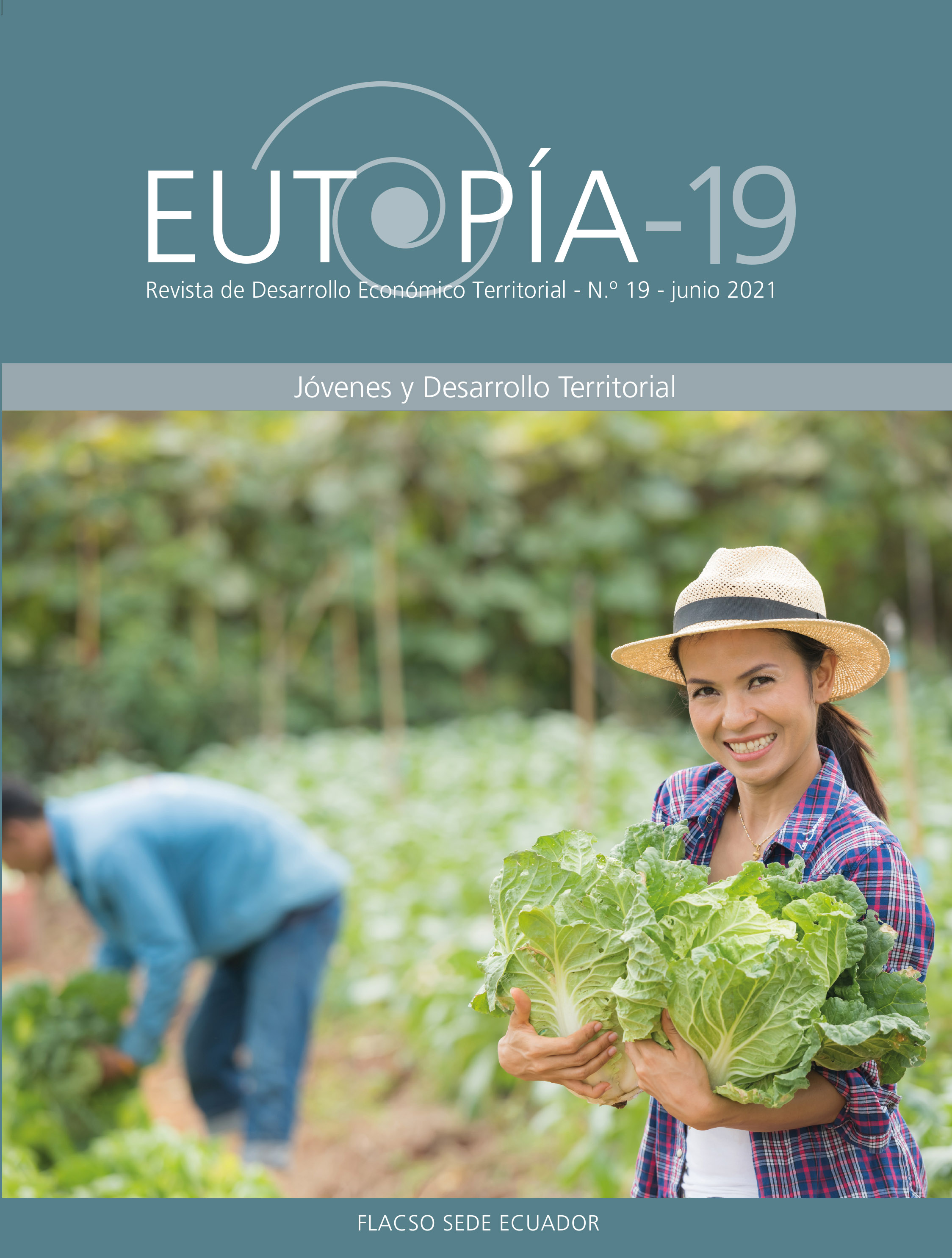Rural youth facing corn monoculture: an analysis from graduates of engineering in sustainable agricultural innovation
Abstract
Through the case of the graduates of the Agricultural Innovation Engineering program in the municipality of Cuquío, Jalisco, Mexico, this article explores the limitations and possibilities of young people to influence the agricultural environment in which they live, which is dominated by agro-industrial logics that have promoted a supposed development through corn monoculture. Through in-depth interviews and participant observation, it is analyzed how these young people, who already had some relationship with conventional agriculture since their childhood, upon entering higher education are trained to influence the agricultural development of the region with a sustainable perspective; however, when interacting with their context, they encounter obstacles that make them rethink their role as young people and as professionals, thus showing the socially exclusive and environmentally predatory nature of the global agri-food system in which the rural youth condition is configured
Downloads
References
Ávila, R. y A. Velázquez. 2006. "Notas y reflexiones sobre los ranchos y rancheros. Una visión panorámica". Estudios del hombre: 81-100.
Bevilaqua, J. O. 2009. "Juventud rural: una invención del capitalismo industrial". Estudios Sociológicos 27 (80): 619-653.
Cazzuffi, C., V. Díaz, J. Fernández y J. Torres. 2018. Aspiraciones de inclusión económica de los jóvenes rurales en América Latina: el papel del territorio. Santiago: RIMISP.
Detsch, C. 2018. La transformación social-ecológica del sector agrario en América Latina. México: Friedrich-Ebert-Stiftung. Proyecto Regional Transformación Social Ecológica.
Dirven, M. 2016. Juventud rural y empleo decente en América Latina. Santiago: FAO.
Duarte, K. 2013. "Acción comunitaria con jóvenes. Desafios generacionales". Última Década 39: 169-195.
Emiro, E. 2010. Investigación acción. Metodología transformadora. Zulia: Fondo Editorial UNERMB.
Emmanueli, M., J. Jonsén y S. Monsalve. 2009. Azúcar rojo, desiertos verdes. Informe latinoamericano sobre monocultivos y violaciones al derecho a la alimentación y vivienda adecuadas, el agua, la tierra y el territorio. FIAN / HIC / AL / SAL.
Escobar C. L. 2020. Cuadernillo intergeneracionalidad. Oaxaca: Ideas Comunitarias.
Espinosa, M. 2017. Estrategias rurales de reproducción social. La agroindustrialidad y la campesinidad de una organización en Jalisco, México. Guadalajara: Universidad de Guadalajara.
Gutierrez-Rosete, J. G. 2011. Hacia una pedagogía para la integralidad (tesis doctoral). Universidad La Salle Costa Rica / Universidad Veracruzana.
Hernández, E. 1988. "La agricultura tradicional en México". Comercio Exterior 38 (8): 673-678.
IIEG. 2019. Diagnóstico municipal. Cuquío. Zapopan: Instituto de Información Estadística y Geográfica de Jalisco.
INEGI. 2020. Censo de población y vivienda. México: Instituto Nacional de Estadística y Geografía.
Jimenez, M. 1990. "La fundación Rockefeller y la investigación agrícola en América Latina". Comercio Exterior 968-975.
Kay, C. 2019. "Transformaciones rurales en la era neoliberal. Dominio global del agro-negocio". Ecuador Debate: 141-154.
Lüscher, K., Klimczuk, A. y A. Hof. 2017. Generaciones, relaciones intergeneracionales, política generacional. Un compendio multilingüe. Universität Konstanz.
Pérez O. A. 2014. Subversión feminista de la economía. Aportes para un debate sobre el conflicto capital-vida Madrid: Traficántes de Sueños.
Quintana, R. D. 2007. "Intervenir o no intervenir en el desarrollo: es, o no es la cuestión". Cuadernos de Desarrollo Rural: 63-86.
Reguillo, R. 2012. Culturas juveniles: formas politicas del desencanto. Buenos Aires: Siglo XXI.
RIMISP, C. L. 2020. Informe latinoamericano pobreza y desigualdad 2019. Juventud rural y territorio. Santiago: RIMISP / Centro Latinoamericano para el Desarrollo Rural.
Sánchez de la Yncera, I. 1993. "La sociología ante el problema generacional: anotaciones al trabajo de Karl Mannheim". Reis: 147-192.
Sánchez, D. 2020. Palos altos entre la muchachada y la juventud: la condición juvenil rural en una comunidad ranchera de Jalisco (tesis doctoral). Ciudad de México: UAM Xochimilco.
Saraví, G. 2009. Transiciones vulnerables. Juventud, desigualdad y exclusión en México. Ciudad de México: CIESAS / Casa Chata.
Sierra-Diaz, E., A. D. Celis-de la Rosa, F. Lozano-Kasten, L., Trasande, A. Peregrina-Lucano, E. Sandoval-Pinto y H. Gonzalez-Chavez. 2019. "Urinary pesticide levels in children and adolescents residing in two agricultural communities in Mexico". International Journal of Environmental Research and Public Health 16: 562.
Soloaga, I. 2018. Diagnóstico de las juventudes rurales de México, Serie Documento de Trabajo 241. Programa Jóvenes Rurales, Territorios y Oportunidades: Una Estrategia de Diálogos de Políticas. Santiago: RIMISP.
Svampa, M. 2019. Las fronteras del neoextractivismo en América Latina. Conflictos socioambientales, giro ecoterritorial y nuevas dependencias. Alemania: CALAS / Universidad de Guadalajara.
Toledo, V. 1999. "Campesinidad, agroindustrialidad, sostenibilidad: los fundamentos ecológicos e históricos del desarrollo rural". Revista de Geografía Agrícola 28: 7-19.
Copyright (c) 2021 David Sanchez Sanchez

This work is licensed under a Creative Commons Attribution-NoDerivatives 4.0 International License.

Eutopía, Revista de Desarrollo Económico Territorial, operates under Creative Commons Attribution-No Derivative Work 3.0 unported (CC BY-ND 3.0).
The authors who publish in Eutopía accept these terms:
You are free to share / copy and redistribute the material in any medium or format for any purpose, including commercial. Therefore, authors retain the copyright and cede to the journal the right of the first publication (CC by-ND 3.0), which allows third parties the redistribution, commercial or noncommercial, of what is published as long as the article circulates without changes.
The following conditions exist for the authors:
Recognition - you must recognize the authorship, provide a link to the license and indicate whether changes have been made. You can do this in any way reasonable, but not in a way that suggest that has the support of the licensor or receives it by the use he makes.
Without Derivative Work – If you remixed, transform or create a work from the original material, you cannot broadcast the modified material.
For more details, visit the page of Creative Commons (CC).


























